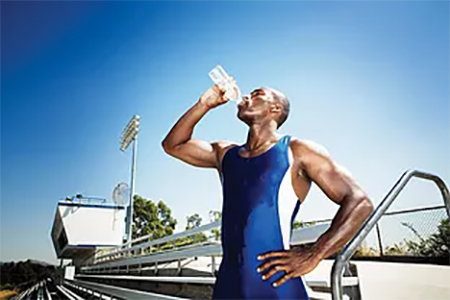
Whether you’re a serious athlete or a recreational exerciser, it’s important to make sure you get the right amount of water before, during, and after exercise.
All athletes need to drink extra fluids to replace body water lost during exercise (e.g. sweat). When it's warm, your body perspires more to help you cool down.
Depending on the temperature, humidity, and the nature of your activity, you might not even realize how much you are perspiring. Don't rely on thirst alone to tell you how much you need to drink.
To keep those muscles working and avoid fatigue; it's extremely important to drink plenty of liquids before, during, and after the activity.
There are no exact rules for how much water to drink while exercising because everyone is different.
You need to consider factors including your sweat rate, the heat and humidity in your environment, and how long and hard you are exercising.
As a general rule, to maintain adequate hydration, drink fluids before and after the game, Drink about 250 -300 ml of fluid two hours before the activity.
That helps make sure you are well-hydrated before you ever go outdoors. Then, during the activity, try to drink 150-200 ml every 15-20 minutes to keep your muscles well-hydrated.
If you are planning an hour-long walk or gym workout, fill a water bottle with about 500 ml and take it with you.
For most people, water is all that is needed to stay hydrated. However, if you will be exercising at a high intensity for longer than an hour, a sports drink may be helpful.
The calories, potassium, and other nutrients in sports drinks can provide energy and electrolytes to help you perform for a longer period of time.
Choose a sports drink wisely. They are often high in calories from added sugar and may contain high levels of sodium. Also, check the serving size. One bottle may contain several servings.
If you drink the entire bottle, you may need to double or triple the amounts given on the Nutrition Facts Label. Some sports drinks contain caffeine.
If you use a sports drink that contains caffeine, be careful not to get too much caffeine in your diet.
Dehydration happens when you lose more fluid than you drink. When your body doesn’t have enough water, it can’t work properly.
Dehydration can range from mild to severe. Symptoms of dehydration can include the following:
In case of any such symptoms get medical attention immediately.
Heat illness or heat-related illness is a spectrum of disorders due to environmental exposure to heat.
It includes minor conditions such as heat cramps, heat syncope, and heat exhaustion as well as the more severe condition known as heat stroke.
Heat illness can occur when the body is dehydrated and can’t cool itself effectively during exercise in hot or humid weather.
This depends on your body weight and the kind of activity you are doing. Talk to your Nutritionist if you have questions about the right amount of water to drink while exercising.
In case of any related query related to sport nutrition or weight loss book an appointment with Dt. Silky Mahajan please send us a mail at info@foodsandnutrition.in or call on 080 6741 7780 (Dial Extension: 778).
